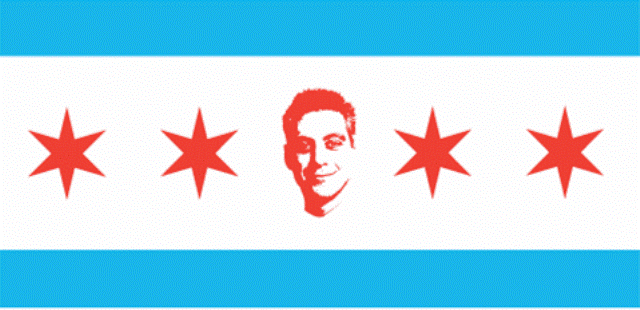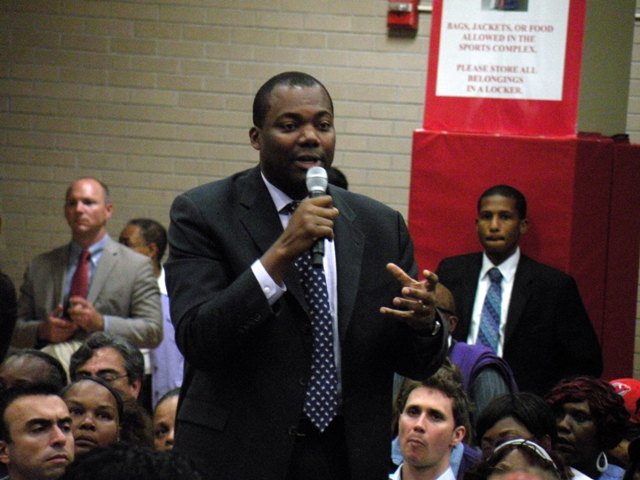Road To Nowhere: A Timeline Of The Events That Led To The Chicago Teachers Strike
By Chuck Sudo in News on Sep 14, 2012 4:40PM

The Chicago Teachers Union didn’t decide on a whim to call the first teachers strike in the city in a quarter century. It was the culmination of a series of events over a nearly two-year period. Here is a timeline of the moments that led to the now five-day old strike.
June 2010: The election of Karen Lewis
Lewis was elected overwhelmingly in a runoff election against incumbent Marilyn Stewart, as she promised an energetic fight against proposed job cuts and resources and an increase in class sizes.
Almost from the moment she was elected, Lewis showed a disdain for the people in charge of the school system and blamed them for the situation in which Chicago Public Schools found itself.
"The only people who can improve our public schools are professional educators," Lewis said shortly after she was elected.
A frequent target of Lewis's scorn was former Chicago Public Schools CEO and current Education Secretary Arne Duncan, on whose watch the school system saw a rise in charter schools. The conservative think tank Education Action Group Foundation released video in November 2011 of a speech Lewis gave during a teaching conference for social justice in Seattle where she mocked Duncan's lisp, joked about her pot smoking days at Dartmouth College and having the perfect resume for an affirmative action quota hire.
Lewis later apologized for "this 120 seconds of poor humor" but was otherwise defiant.
"Or our fight to end the structural inequality in our schools. What I said should not be taken as an example of what a teacher is or is not. I was speaking as an individual, albeit as a leader of a union, and as a person who is part of a coalition that has been in a hard and mostly unpublicized fight against some very powerful forces."
Sept. 2010: The Election Of Rahm Emanuel
The other sea change was former Mayor Richard M. Daley’s Sept. 2010 announcement he would not seek re-election and the chain of events that led to Rahm Emanuel’s 2011 election as mayor. Emanuel and organized labor have long had a wary relationship and union support for his campaign was lukewarm, at best. Throughout the candidacy, Emanuel said he would work toward a longer school day for CPS: currently Chicago has the shortest school day in the nation. Emanuel also promised to look at charter schools as an alternative to the neighborhood schools in the system as a way to improve education. Lewis had consistently criticized charter schools for taking the limited resources the school system had away from neighborhood schools.
April 2011: The Hiring of Jean-Claude Brizard

Chicago Public Schools CEO Jean-Claude Brizard at a Sept. 2011 town hall meeting (Photo credit: Chicagoist/Chuck Sudo)
Emanuel’s school plan began to take some shape with the April 2011 announcement of Rochester, NY public schools head Jean-Claude Brizard as CPS’ new chief executive officer. Brizard’s policies of closing underperforming schools, embracing charterization and merit-based pay for teachers fell in line with Emanuel’s vision for the school system. Teachers and parents were concerned with reports of Brizard being an opportunist by leaving for Chicago, clashing with teachers while he was in Rochester, and leaving that school system in worse shape than he found it. Brizard defended his time in Rochester.
“I'm not going to say I'm not ambitious. Everyone wants to be ambitious. I work hard. For me, it is about the work, not about money and certainly not about seeing what is next. I am not a serial superintendent,” Brizard said.
June 2011: The Chicago School Board Rescinds Teachers Pay Raises
Shortly after the ink had dried on Brizard’s CPS contract the Chicago School Board, led by Emanuel’s hand-picked chief David Vitale, they rescinded a planned 4 percent pay raise promised to teachers in their contract. The School Board enacted a “reasonable expectation" clause and said they didn’t have the estimated $100 million to guarantee those raises. Vitale and the School Board then approved pay raises to Brizard and four other CPS staffers a week later, saying the new salaries are based upon enhanced responsibilities, the compensation of previous employees and other factors. Government watchdogs such as Better Government Association Andy Shaw said that Brizard and his team should show some improvement with CPS before the School Board votes them raises. Lewis stated her intention to open negotiations on the School Board’s rescinding the teacher pay raises.
Brizard’s first budget as CPS CEO was released in August 2011 and called for a maximum increase in the property tax levy used to help fund the system. At the same time, Brizard offered teachers at schools a 2 percent pay raise if they accepted a 90-minute extension to the school day. (Odd for a school board that didn’t have the money two months earlier.)
With a few exceptions, CTU rejected Brizard’s offer. Brizard took to promoting his plan via the media, as in this Sept. 2011 appearance on WTTW's Chicago Tonight.
Watch August 23, 2011 - School CEO Jean-Claude Brizard on PBS. See more from Chicago Tonight.
April 2012: Stalemate
Unable to come to a deal on a new contract, CPS and CTU agreed to set up a fact-finding panel with a neutral arbitrator to issue a report recommending terms for a settlement. That report was issued in mid-July and rejected by both sides.
June 2012: Sticking With the Union
As tensions between the two sides increased and negotiations on a new labor deal soured, CTU held a strike authorization vote in June. Changes to state law made it harder for teachers’ unions to call a strike: at least 75 percent of a union’s rank-and-file must be in favor of a strike. Ninety percent of CTU’s membership voted in favor of a strike.
July 2012: Agreement On A Longer School Day
One of the major roadblocks between the school district and teachers’ union was the implementation of a longer school day. The two sides were able to reach a deal July 24 where CPS agreed to hire 477 formerly laid-off teachers to fill the gaps in the longer school day. Both sides declared victory: Lewis called the agreement “movement in the right direction;” Emanuel said the deal was “a break from the past.” But CTU was the winner here by getting CPS to agree to the new hires, which would cost the already cash-strapped school system an extra $40-50 million. Asked how they could afford it, Emanuel said, “we can’t afford not to.”
August 2010: Karen Lewis Given Approval To Set Strike Date
Under state law the teachers union had to wait 30 days after the arbitrator’s report was rejected before setting a strike date. On Aug. 23 CTU’s Board of Delegates gave Karen Lewis permission to set a 10-day strike notice. Lewis said she only would set a date as a last resort, but with tensions between the two sides running high at the bargaining table, she set a strike date of Sept. 10.